When it was first announced on Jan. 6 that Gov. Ron DeSantis had appointed six new members to New College’s Board of Trustees (BOT), various media outlets began calling this move a “hostile takeover”—with a seventh new member joining them on Jan. 26. There was little information through any official channels to indicate what a takeover might involve, although one of the new appointments, Christopher Rufo of the Manhattan Institute, had been very vocal on Twitter about his intentions to abolish Diversity, Equity and Inclusion programming (DEI), and about his reactions to New College students themselves. Rumors were bolstered by an impromptu on-campus meeting he held alongside new trustee Jason “Eddie” Speir on Jan. 25.
Yet DEI-related matters proved to be a mere footnote during the Jan. 31 BOT meeting—the first time all New College BOT members, new and old, had gathered on official business in accordance with the Florida Sunshine Law. The result was a sudden overhaul of New College leadership. Dr. Patricia Okker was removed from her position as New College President, effective immediately. Chief of Staff Bradley Thiessen was promoted to immediate interim President and a motion was approved to enter into discussion with former Education Commissioner of Florida Richard Corcoran to assume the role of full-time interim President. The BOT also voted to replace Chair Mary Ruiz with new trustee Debra A. Jenks, effective immediately.
A Catalyst reporter was in attendance during the full BOT meeting in the Sudakoff Conference Center, which ran from 3 p.m. to approximately 6:45 p.m. Here’s an in-depth account of what happened, which motions were passed, the proposals of each board member and what can be expected at the next BOT meeting on Feb. 28.
Call to Order
All 13 trustees attended the meeting in-person. Those newly-appointed by DeSantis included Rufo, Speir, Jenks, Ryan T. Anderson, Dr. Mark Bauerlien, Dr. Charles R. Kesler and Dr. Matthew Spalding. Returning members included Ruiz, Vice Chair Ron Christaldi, Dr. Lance Karp, Dr. Sarah Mackie, Chair of the Faculty Dr. Matthew Lepinski and New College Student Alliance (NCSA) President Grace Keenan. Also present at the table were Associate Vice President for Government Relations Christie Fitz-Patrick, interim General Counsel David Smolker and then-President Patricia Okker.
Approximately 100 seats had been reserved for members of the public, 30 seats for media personnel. The public audience consisted primarily of Sarasota community members, alums, parents of current students and New College administrators. Some carried signs with slogans such as, “Keep diversity, equity and inclusion” and “NCF is public—not the Christian Hillsdale.” A handful of current students and faculty were also present. While Sudakoff has a seating capacity of 400, the seating restriction left an overflow crowd of students, faculty and others to watch the proceedings via livestream in various locations throughout campus.
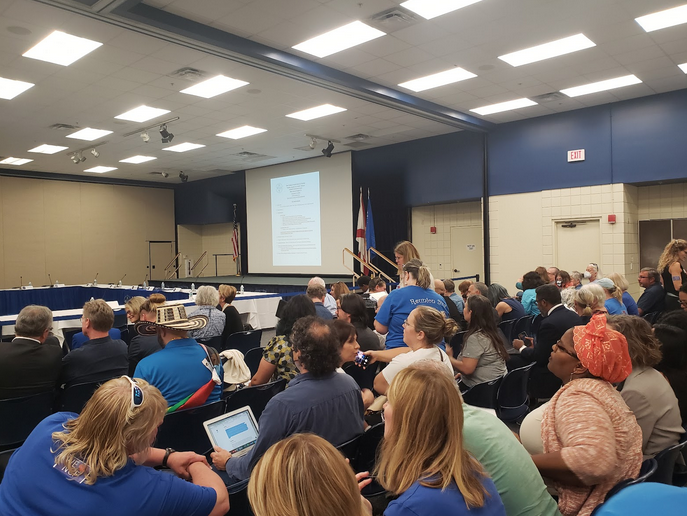
The meeting opened with a prayer delivered by Campus Minister Rev. Dwight Henry, who spoke on the principles of “loving thy neighbor” and keeping “student’s future at the forefront of our decisions.” This appears to have been a compromise by the college, as Speir posted on his personal blog on Jan. 29 that he had initially requested to lead a prayer himself during the meeting.
“I disagree and find it to be less constitutional since the campus pastor is more established in his religion than the trustee who requested prayer in the first place, but so be it,” Speir wrote.
The BOT then began the public comment segment of the meeting. Comments were limited to one minute each and speakers were required to sign up in advance. Twenty-three individuals spoke, including one current student, one current staff member and five current members of the faculty. This group spoke primarily in support of Okker and of the Office of Outreach and Inclusive Excellence (OOIE). Both Associate Professor of Biology Elizabeth Leininger and Associate Professor of Sociology Queen Zabriskie used their public comment minute to explain that the OOIE performs work mandated by the state—which includes submitting required equity reports to the Board of Governors (BOG)—and also offers financial counseling, builds relationships with the local community and protects the freedom of religion on campus. Associate Professor of Mathematics Chris Kottke read a statement endorsed by 68 other faculty members in support of Okker, and New Music New College Producer Ron Silver said that to remove Okker from her position at this time would be “unfair, unseemly and unwise […] when she is just beginning the work that the BOT asked her to do.”
Assistant Professor of Theater and Performance Studies Diego Villada spoke particularly to Rufo about the wellbeing of current students.
“Your actions today in concert with the effective rhetoric of your online persona make my students feel hopeless,” he said. “Many students came here to feel safe and access the education that is their right as Floridians. And the impulse to make this a place where race, intersectionality and DEI are banned indicates to them that you want everyone to be the same, to be like you.”
Speakers unaffiliated with the college included parents of current students, such as Kristen Miller. “I ask you to please do the proper research, talk to the current students on their terms, recognize these amazing professors and their classes and see why we love New College and the model of education for our young adults,” Miller said.
“Where is the freedom?” asked Ruth Beltran, a community organizer with the Party for Socialism and Liberation (PSL). “DeSantis and his cronies love to talk about freedom. But how come some of them come from out of state and try to decide the lives of students and parents? Where is the democracy?”
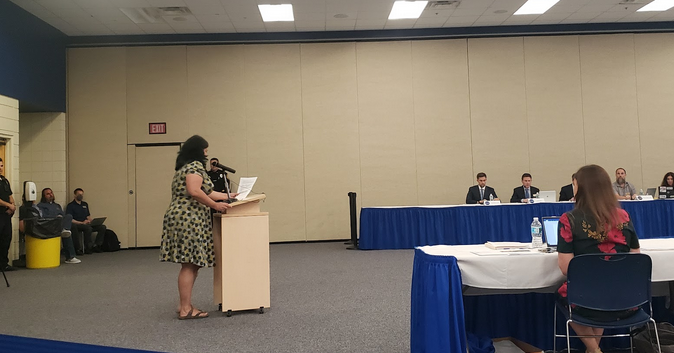
Consent Agenda and Announcements
Once public comment concluded, Ruiz asked for the board to approve the consent agenda—a tool used to streamline meeting procedures by collecting routine, non-controversial items into one group which can be passed in a single motion and vote. Before any vote could occur, Speir asked that agenda items three and four be tabled until the next meeting, on the grounds that “we need to give the board more time to [go] over these things.” Items three and four were moved to discussion.
Agenda item three—”Approve Student Success Plan Completion”—consisted of reclassifying both the Psychology and Economics programs. Both of these programs are classified under the “liberal arts” Classification of Instructional Programs (CIP) code, under the taxonomy system devised by the U.S. Department of Education. Approving this agenda item would allow them to be reclassified “more accurately”—said Provost Suzanne Sherman who offered explanation during the meeting—under the “areas of strategic emphasis” CIP code. This move would not change the curriculum or teaching lines of these programs, only their classification.
The agenda item had been reviewed by the Academic Affairs Committee one week prior, and it fulfilled a requirement placed on the BOT by the BOG to implement the college’s improvement plan. Choosing to defer this agenda item would mean that New College would miss the Feb. 13 deadline for performance-based funding, and by consequence, lose $900,000.
Even so, Speir motioned for this item to be deferred, and said, “I don’t believe we can adequately review this and approve it given the amount of time we’ve been on the board.”
“He’s trying to sabotage us,” a member of the audience called out.
A vote commenced in order to determine whether agenda item three would be deferred. The motion failed in a 5-8 vote, with trustees Jenks, Kesler, Rufo, Spalding and Speir voting in favor. Immediately after, the vote to approve agenda item three passed 12-1, Speir being the only dissenting vote.
Agenda item four, “Approve 22-23 Direct Support Organization’s Budgets,” involved approving the budgets of the New College Development Corporation and the New College Foundation, which had already been approved by their respective boards and the Finance & Administration Committee. These organizations are private, independent entities from the college and do not handle state money, which was explained by Christaldi to the other trustees. However, Rufo began to explain that contributions from last year were $800,000 while operating expenses were $2.3 million, and suggested that it would be irresponsible to approve the budget. Ruiz interrupted to clarify that this was not approval for a new budget, but a new requirement to approve a budget that had been in place since July 2022, and offered to defer it to the next meeting to give the new trustees more time to review it. The motion was suggested and approved, shortly followed by the approval of the consent agenda.
Ruiz then explained that she had been contacted by the BOG regarding the new trustees, some with no prior experience in education. She announced that BOG Chancellor Ray Rodriguez, BOG General Counsel Ryan Newman and New College BOG liaison Adam Levine would be attending the next meeting in order to provide an orientation on the responsibilities and requirements of the trustee position.
Spalding then interjected to make an announcement.
“Some have said these recent appointments amount to a partisan takeover of the college—this is not correct,” he said, which was met with laughter from the audience. “We have been appointed by the BOG along with a faculty representative and student representative, and this being a public institution, acts in accordance with the laws of the state of Florida, passed by legislature representing the people of Florida.
“A well-constructed program of students in liberal arts teaches one how to think, not what to think,” he continued. “It liberates the mind from prejudice and narrow-mindedness, but also political ideology, partisan dogma or whatever methodology is academically evoked. It’s not a takeover, it’s a renewal.”
Spalding then made a motion, as “a sign of good faith,” for the BOT to adopt a resolution to “reconfirm its commitment to the distinctive mission and supporting goals of New College.” While this sentiment was broadly supported by the other trustees, old and new, Ruiz pointed out that the resolution was not on the agenda, was not in any written form and had not been reviewed by anyone, and so instead asked that it be taken up more formally at the next meeting. She reminded the board that, due to the Sunshine Law which requires public notice of agenda items, “pop-ups are frowned upon.” This comment was met with applause from the audience.
Ruiz concluded with a prepared statement for the new trustees about the opportunities for change that this board presents—and what should not change. She emphasized the strength of New College’s contract system, narrative evaluations, affordable tuition, career exploration opportunities and independent research as things which should be preserved. She also included statistics that New College has seen a 30% enrollment increase and a 90% annual increase in state college transfer in Fall 2022.
In terms of effective change that this board could initiate, she listed the $38.8 million in overdue maintenance of student residential spaces and the limited food options on campus, as well as the fact that New College faculty salaries are in “the bottom quartile of the state university system.”
“While New College students don’t receive grades, I regret to inform this BOT that we get a report card,” Ruiz told the new appointees. “These are metrics to which the Governor, the Legislature, the BOG hold all state university boards accountable. And at the end of the year, we will know whether this board improved those metrics, sustained them or experienced a reversal.”
Presidential Report, Student Report and Legislative Priorities
President Okker’s report introduced newly-appointed board members to the various strengths of New College, emphasizing that “weekly, if not daily, there is evidence of the extraordinary scholarly achievement happening here.
“It is my hope that all trustees never forget this essential fact: students are the focus of New College,” she continued. “They are why we exist. Everything we do here and any changes that we contemplate must be weighed, first and foremost, on the impact on students. Students who choose to come to New College are nothing less than incredible, and they deserve nothing less than our very best.”
Okker received a long standing ovation from the audience.
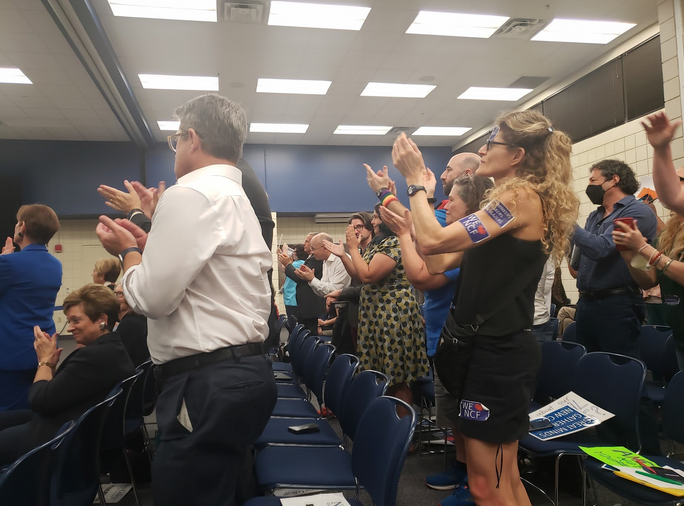
Keenan then gave a student report, in which she expanded on Ruiz’s list of things that this board could change to benefit the school, including facilities and dorm conditions, staffing shortages in Student Affairs and a lack of internal communication.
“I really want to commend Dr. Okker, because she came in and she recognized that problem and did something about it,” Keenan said. “She has repaired so many relationships on this campus, built trust in her and in the people running the college, and that takes a lot of time and energy, and I thank you for that.”
Fitz-Patrick then walked the BOT through the agenda items being lobbied for in the upcoming legislative session. Two of these items are ranked #1 and #7 on the state’s public capital outlay fund list— just over $5.7 million for renovations to the Hamilton classrooms (HCLs) and funds for the Pritzker Marine Biology Research Center. A third item would award the college $1.24 million in University of Distinction funding. .
At around this time, Rufo could be seen scrolling through his phone. Sarasota Magazine shortly afterwards identified that he was liking posts on Twitter during these presentations. Once Fitz-Patrick had finished speaking, Rufo announced to the board that he had met with DeSantis earlier that day, who had pledged to work with the legislature to provide the college with $15 million “if we can meet expectations,” and implied that more money could be on the horizon.
Finance & Administration Committee
Vice President of Finance & Administration Chris Kinsley and Chief Human Resources Officer Erica Worthy gave a presentation to the board, explaining that they had finished negotiations with the New College United Faculty of Florida (NCUFF) union, consisting of about 100 employees of the college, which were now being brought to the BOT for approval.
For context, Smolker explained that because of the odd calendar days in different years, it has become customary throughout the university system to offer employees an extra bi-weekly pay once every 11 years. New College faculty had the option to receive their salary either over a nine-month period or spread out over a twelve-month period. Faculty who chose the latter received that extra payment, but faculty who chose the former did not. Approving this proposal would rectify that by offering a one-time corrective payment for nine-month faculty which would go into effect on Feb. 5.
Rufo told the board that he had spoken with Chief Compliance Officer Alex Tzoumas on the matter, and said Tzoumas insisted that the one-time faculty payment as written in this contract was a violation of Florida statute. He recommended that an independent counsel review it, and Ruiz informed him that this had already been done, as Smolker could confirm.
“It’s a tricky situation,” Smolker said. “Sometimes you’re faced with a situation where you’ve got to look at the law side, but as a lawyer there’s another side that’s called the equity side.”
“We’ve had multiple reviews from two attorneys and the conclusion is, by both attorneys, that it’s proper,” Ruiz continued.
However, other trustee members were not in agreement.
“I would consider each of us individual judges,” Speir said. “I think what a judge would say is, ‘I need more time to look at this,’ so that is what I recommend. Time to look at this.”
This statement was met with uproar from the crowd, with one member shouting, “He’s got a god complex.”
In response, Ruiz told new appointees that they needed to be properly prepared for the meeting and should not neglect to read the informational packet distributed to each member.
“I am very sympathetic with the line of work that each of you are undertaking, as trustees,” Ruiz said. “But we do try to get that packet out at least a week in advance, we do have committees review it so that the trustees have an in-depth understanding of these matters. I would ask trustees in the future to read the packet [and] to identify questions that you have.”
A motion was made and passed to defer the discussion to the next meeting, on the grounds that some trustees did not feel prepared to vote. Because the approval did not go through at this meeting despite the negotiations already being ratified by the union, retroactive payment will be deferred until March.
Role of Office of Outreach & Inclusive Excellence
This agenda item marked the first official presentation given by a new trustee to the New College community—and it was perhaps unsurprising that Rufo was the one to deliver it. Much of Rufo’s platform as a trustee is his insistence that DEI initiatives spell disaster, as shown by how he began his presentation by calling New College “a college in crisis”—but not for any reasons involving student life, retention or faculty wages, as returning trustees had expressed.
“Diversity, equity, and inclusion—which sounds great, but in practice, divides people and offers separate judgments on the basis of race,” Rufo started to say before he was cut off by loud boos from the audience.
“Your opinions don’t matter,” came a shout from the crowd.
“I think it does matter, actually, unfortunately for you,” Rufo called back.
He continued by elaborating on a proposal included in each trustee’s informational packet, titled “Abolish DEI Bureaucracy and Restore Colorblind Equality in Public Universities.” The proposal included four primary principles: abolishing the OOIE and firing the four employees who work there; banning current and future use of diversity statements; prohibiting mandated diversity training’ and prohibiting any examples of “identity-based preferences.”
The proposal was originally drafted for legislative texts, Rufo acknowledged, and so would need to be adapted for a university. The full proposal can be read in the Jan. 31 BOT agenda, linked at the top of this article. The words “colorblind” and “equality” appear only in the title of the proposal, and Rufo’s definition and implementation of these terms are not discussed in any depth.
“The whole meaning of the word equity is actually to create separate standards for people based on their identity categories,” Rufo stated. He placed this proposal forward as a motion, which was quickly seconded and quickly followed by boos.
Ruiz clarified that DeSantis was currently working with the BOG to develop related policies, some of which could contradict or interfere with Rufo’s proposal: “We try not to get ahead of that policy development at the state level,” she advised. She also suggested that this motion would need to be presented in writing and come with a transition plan in order to gauge how it could be realistically achieved.
“We have a lot of accountability points as a BOT,” Ruiz said. “There are statutes, there are regulations, there is a system that the Governor has set up through the BOG. We have to understand the impacts at all these levels and get information through all of these sources.”
Keenan added that Rufo’s proposal does not necessarily apply to New College—for instance, New College does not have mandated diversity training—and so further information was required. She also reminded the board that the OOIE fulfills many roles on campus beyond DEI work, and so careful consideration would be needed before terminating the office outright.
The audience had been especially active during this point in the meeting, and so Bauerlein, who had been relatively quiet up to this point, turned and raised his voice to speak directly to the crowd.
”For many people in Florida in this country, DEI is experienced as coercive and oppressive,” he said, which was met with boos. “A concrete example of a practice is requiring of faculty DEI statements. This is a McCarthyite litmus test. It inserts ideological contents—these are loaded terms. These are not neutral, objective terms.”
Ruiz continued to caution the trustees, saying that they did not have guidance from the BOG at this time. Relenting, Spalding suggested that the motion be amended to one of intent instead of action—that they vote to direct staff to draft a policy based on Rufo’s proposal consistent with federal law, and then research ways it could be adapted further for the next meeting. Rufo accepted this new motion and Speir seconded it, only to then admit that he did not fully understand the new motion.
Discussion ensued to clarify the “intent” of this amendment. The previous motion was withdrawn in favor of a new motion to seek advice from staff, conduct further research on the current role of the OOIE and to revise Rufo’s plan, complete with legal implications. This motion was passed.
Okker’s Employment Agreement
“I think it’s safe to say that the landscape has dramatically changed,” Ruiz began. “Leadership challenges are different, and I want to have a discussion about President Okker’s employment agreement in light of those challenges.”
A long silence followed, broken by Okker stating that “this is not how I thought this was going to go.
“I understand that there is a new mandate for this college, and I have been informed that the plan includes the termination of my employment as President,” Okker continued, followed by an outburst from the audience.
Indeed, some four and a half hours before the meeting began, a handful of media outlets began publishing articles stating that the BOT intended to fire Okker and replace her with Corcoran. Later in the meeting,Ruiz attributed this to trustees publishing their intent to do so on social media. She did not name which trustee or trustees made such public comments.
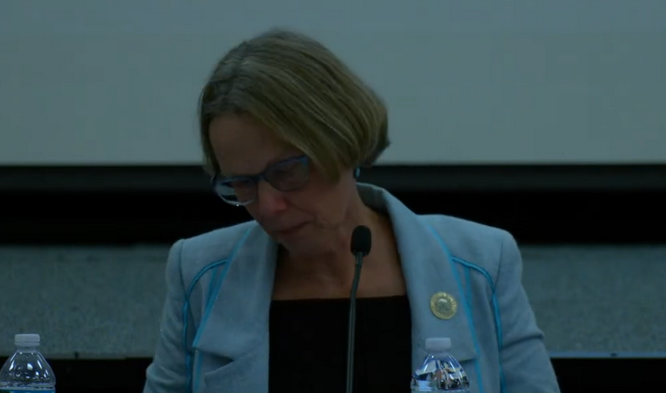
Keenan argued that, considering the significant enrollment increase New College had seen during Okker’s comparatively short time as President, she was still the right person for the position.
Smolker then gave some details about Okker’s employment contract. To terminate without cause requires a two-thirds vote from the BOT, and evidence must be provided if the BOT were to terminate with cause. Speir interrupted to say, “I don’t think anybody is thinking that this is for cause.”
To be terminated without cause means that Okker is entitled to 20 weeks of severance pay. Additionally, an amendment in her employment agreement included in the trustee’s informational packet—which not all of them had read, leading Speir to ask for a summary—stated that she is relieved of all duties if terminated without cause effective Feb. 1. Shouts of “no” and “stay” could be heard in the crowd throughout this explanation.
Keenan continued to insist that the new trustees get to know Okker and develop a deeper understanding of how New College operates before making any decisions about her employment. Rufo, however, said that their consideration was not reflective of Okker’s scholarship or character. Speir seconded this, shortly before stating that he was the one who put Okker’s employment agreement on the agenda.
“What looks horrible and mean, in the end [is] always about what is best for everybody involved,” Speir said. “If you look at what New College needs rather than being led by our hearts and feelings, I think that’s better.”
More discussion ensued between returning trustees who advocated for Okker and newly-appointed trustees who argued in favor of her removal, before Okker spoke up once more.
“I have carefully prepared remarks, and now I’m going off script,” Okker said, voice shaking noticeably. “First of all, let me say that the support I feel in this room is tremendous. And what I’m going to say—I am going to let you down.”
Okker began to say that “the vision that we created together is not the vision that I have been given as a mandate here,” but was cut off by Chistaldi. He allowed her the opportunity to continue speaking, but said he had remarks he wanted to give first. Okker let him continue. He thanked her for seeing New College through the coronavirus pandemic and two hurricanes this past semester, and for getting enrollment up, but also said that “the world has changed around us.” He then put forward the motion to terminate her employment agreement. It was quickly seconded.
Okker continued immediately afterwards, before a vote could be called for: “My deepest apologies to the people whom I am disappointing. But I am going to say publicly, I do not believe that students are being indoctrinated at New College.” This was met with raucous applause.
“You cannot ask me to go forward and argue that we are indoctrinating students here,” she continued. “I do not believe it. I understand that there are differences of opinion on that, but I will not be persuasive on this point.
“So I feel like when I’m given this new mandate, that this is a hostile takeover and a dramatic change,” Okker said before being cut off by Christaldi, who recommended that she finish her remarks after a vote was cast. She agreed.
Smolker explained that if Okker were to be fired during this meeting, an interim President would be needed and an immediate presidential search would have to commence, which could take anywhere from nine to 12 months, likely longer. At this point, Bauerlein raised his voice to address the audience once more, who continued to interject with pleas that the BOT not fire Okker.
“You sat up here and called us racist, sexist, bigots,” Bauerlein said, referring to the public commentary at the beginning of the meeting. “We are now in a position of authority in the college and the accusations are telling us that something is wrong here.”
“Because we disagree?” an audience member responded.
Keenan interjected to clarify that none of the name-calling that Bauerlein was referring to came from speakers who represented the college: “I want to make that clear distinction, and it can be hard because our meetings have to be public, but every student and faculty member has been incredibly respectful.”
Conversation was cut off and a vote on Okker’s employment was held. Anderson, Bauerlein, Christaldi, Jenks, Kesler, Mackie, Rufo, Spalding and Speir all voted to remove Okker from her position. Karp, Keenan and Lepinski voted to keep her in the position, and Ruiz abstained. Immediately after the vote was cast, Okker resumed her closing remarks, uninterrupted by any trustees or audience members.
“To the people of New College: it has been my honor and privilege to serve as your President for the last 19 months,” she said. “Today is a sad day. It’s certainly not the end that I imagined when I joined this remarkable college. But as sad as I am, I also cannot help but feel gratitude. You have welcomed me and my family, you have worked with me to tackle big challenges, and you have shown your stiffest commitment to making this wonderful college even stronger. And for that and for so much more, I will be forever grateful.”
She shared a personal story, and concluded by saying, “To the students of New College: I see you.” And further, “I offer these two final thoughts. First, know that you are truly loved here, not just for what you do, but for who you are. And second, the light that is within you, don’t hide it under a bush. Let it shine. Thank you.”
Okker received a standing ovation that lasted approximately 30 seconds. Crying could be heard from the audience. Many of the few students in attendance left shortly after.
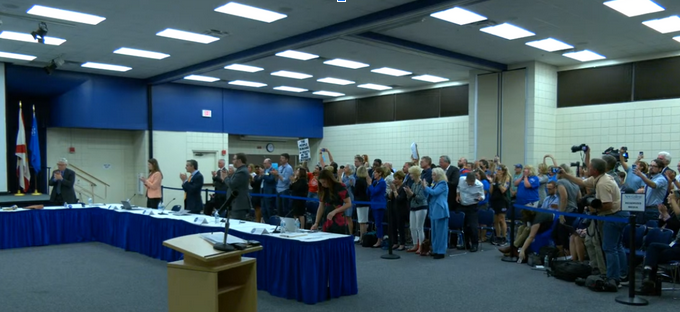
Once the dust settled, Spalding told the board that he had been speaking with Corcoran about taking up the role of interim President, and that he was available to begin in March. He suggested that Theissen act as immediate interim President until then in a two-part motion. Theissen, who was in the audience, agreed to these terms.
Keenan said that she did not feel comfortable voting on this measure, considering that no information had been provided to the BOT about Corcoran in any official capacity. Spalding responded, “That’s why it’s called ‘interim.’”
Keenan continued, pointing out that Corcoran could be interim President for a minimum of nine months, and since they had until March to make a decision, they had time to discuss the issue further and learn if “possibly somebody else, possibly internally, from the school” could step into a full-time interim position.
Spalding said that since they had a motion to vote in favor of Corcoran already, “if you’re not comfortable, you can abstain or vote no.”
“Many of us know and trust Secretary Corcoran from prior experience, I certainly do,” Rufo said between calls of “railroad” and “hostile takeover” from the audience. “I think he’s an authoritative leader, very dynamic, he’s going to make things happen.”
“Do you care about the students at all?” came a cry from the audience.
A vote took place to confirm Theissen as immediate interim President and Corcoran as full-time interim President in March. The motion passed 12-1 with Keenan being the only dissenting vote. Lepinski and Ruiz originally voted to abstain, but changed their votes to yes after being informed by Smolker that a vote was required unless there was a conflict of interest. A chant of “shame, shame, shame” rose from the crowd.
Election of Board Chair and General Counsel updates
More positions were rapidly vacated and filled in the remaining minutes that followed. Ruiz transitioned into discussion about the election of the Board Chair and Vice Chair positions. These positions are filled once every two years and Ruiz still had a year and a half left to serve for her current term. However, she stated that she was willing to resign at the end of this meeting “to allow for the leadership to be chosen that this board will rally behind and have full confidence in.”
Spalding nominated Jenks once Ruiz finished speaking, and a vote swiftly occurred to install Jenks as the new BOT Chair, effective immediately. It is worth noting that Jenks did not speak once during the meeting except to vote.
Christaldi also suggested that he would be willing to step down if any trustees called for this, but none did, and he retained his position as Vice Chair.
Smolker was the next to suggest that he step down from his position as interim General Counsel, explaining that this was his third time filling this role and that while he was the go-to figure the college turned to whenever there was a vacancy, he could not dedicate the time necessary to be a permanent replacement.
Spalding suggested an interim for this position: private attorney and Republican former Florida State Senator Bill Galvano, once again implying that he had discussed a position with a potential appointee in advance by saying that Galvano was “very interested in serving the board in this capacity.”
After Ruiz informed the BOT that it would be more appropriate for Thiessen to make the decision of who to consider for interim General Counsel, a motion was made and passed to direct him to negotiate a contract with Galvano.
Keenan made one final comment: “Considering that we’re a public meeting, subject to Sunshine Laws, [be] cautious of when we are suggesting people for positions and calling them friends as for why we’re justifying that. There’s a lot of ethical implications with that.”
With that, the meeting adjourned. Chants of “Education is a right, we will not give up the fight,” followed the trustees as they exited Sudakoff.
The next BOT meeting will be on Feb. 28. Current agenda items to expect include the following:
- “Approve Direct Support Organization’s Budgets” agenda item, which was deferred from this meeting
- A visit from members of the BOG to give an orientation to the new appointees
- Spalding’s “sign of good faith” proposal, in which the BOT will reaffirm its commitment to the New College mission
- Discussion deferred from the Finance & Administration committee on the legality and equity of distributing a one-time payment to faculty who missed this benefit because of the payroll option they selected
- Rufo’s adapted “Abolish DEI Bureaucracy and Restore Colorblind Equality in Public Universities” proposal
- Galvano’s consideration for interim General Counsel

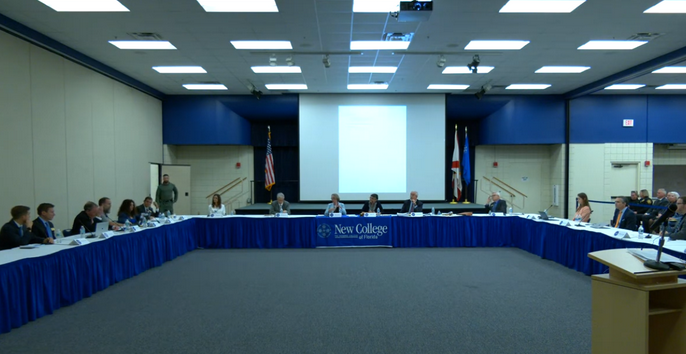
This is a *great* report, thank you!